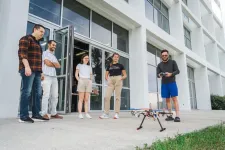(Press-News.org) (WASHINGTON, April 4, 2024) – A study published today in Blood Advances showed that among patients in Denmark who had slow-growing chronic lymphocytic leukemia (CLL) with no symptoms and a low risk for ever needing treatment, those who stopped seeing their doctors for specialized follow-up had fewer hospital visits, fewer infections, and similar survival after three years compared to those who continued to undergo specialized follow-up.
“To the best of our knowledge, ours is the first study of what happens when specialist follow-up for CLL is stopped,” said Carsten Niemann, MD, PhD, chief physician in the department of hematology at Rigshospitalet in Copenhagen, Denmark, associate professor at the University of Copenhagen, and the study’s senior author. “Our findings show that it’s feasible to discontinue specialized follow-up in patients who have a very low risk of needing CLL treatment and that doing so does not cause these patients any harm.”
Eighty-four percent of the patients showed no signs of CLL progression and were not referred back to a hematology department within three years, Niemann said. Among the 16% of patients who developed signs of CLL progression and were referred for specialist care again, those who needed treatment received it in a timely fashion, he said.
CLL – the most common blood cancer in adults – can be aggressive, meaning it grows quickly, or indolent, meaning it grows very slowly. The average age at diagnosis is 70. While aggressive CLL needs immediate treatment, indolent CLL may remain stable for years without treatment. Studies have shown that up to three in 10 patients with CLL never need treatment. However, these patients often undergo years of specialized follow-up, or “watchful waiting,” including exams and blood tests that may cause them worry and psychological distress, researchers said.
In 2022, Niemann and his colleagues published a validated list of symptoms that identified more than 40% of patients with CLL whose yearly risk of needing treatment is less than two in 100. They conducted the current study to investigate the feasibility of ending specialist follow-up for these very low-risk patients.
The researchers retrieved data from a Danish blood cancer database for all patients diagnosed with, but never treated for, CLL at Rigshospitalet, a large academic medical center in Copenhagen. Patients whose CLL characteristics indicated a high or very high risk that they would eventually need treatment were excluded. Among the 200 eligible patients, the researchers selected 112 who were deemed through a review of their medical records to have a low risk of eventually needing treatment to be discontinued from specialized follow-up. These patients were advised to be vaccinated against pneumonia and influenza and to contact their primary care physicians if they developed fever, chills, night sweats, weight loss, or symptoms of infection. The other 88 patients continued their periodic follow-up visits, including physical exams and blood tests, with their hematologists.
The study’s primary endpoint was three-year overall survival. Secondary endpoints included hospital contacts, the time to developing a first infection, the duration of infections, the three-year rate of re-referral to a hematologist, and the time to needing the first treatment for CLL.
During the three-year follow-up period, the researchers tracked how patients were doing by reviewing their electronic medical records, which documented whether and for how long they were hospitalized, whether they received antibiotics or other medications, and so on.
At three years, overall survival was not significantly different for patients at similar risk levels regardless of whether they had continued or been discontinued from specialized follow-up care. Nineteen patients (16%) in the discontinued group were re-referred to hematologists. Of these, three chose to immediately discontinue follow-up care again and 12 to continue watchful waiting; four received CLL treatment. Fourteen patients in the discontinued group died during the follow-up period, compared with 19 patients in the group that continued specialist follow-up care. Causes of death included infections, other cancers, heart disease, stroke, trauma, and Alzheimer’s disease.
Among 2,811 hospital contacts in total, patients who ended and continued specialized follow-up had 873 (31%) and 1938 (69%) contacts, respectively.
Forty-five percent of the patients who discontinued follow-up care developed infections that were treated with antibiotics, compared with 51% of those who continued follow-up care.
“We have demonstrated that more than half of patients with low to intermediate risk for ever needing CLL treatment may safely be selected to stop specialized follow-up,” said Christian Brieghel, MD, PhD, a postdoctoral fellow in hematology at Rigshospitalet and the study’s first author. “They had lower use of hospital and health care resources, a lower frequency of infections, and if they had an infection, they were hospitalized for a shorter time, and their overall survival was comparable to similar patients who continued specialized follow-up care.”
One limitation of the study was that it was not a randomized trial. Rather, the researchers selected patients who met specific low-risk criteria for ever needing CLL treatment to be discontinued from specialist follow-up. In addition, health care in Denmark is universal and free at the point of care; all patients who were discontinued from specialist follow-up were re-referred to a hematologist by their primary care physicians if they developed signs of CLL progression. The study findings might not be generalizable to countries with health care systems based primarily on private health insurance.
# # #
Blood Advances (bloodadvances.org) is an online, open access journal publishing more peer-reviewed hematology research than any other academic journal worldwide. Blood Advances is part of the Blood journals portfolio (bloodjournals.org) from the American Society of Hematology (ASH) (hematology.org).
Contact:
Kira Sampson, American Society of Hematology
ksampson@hematology.org; 202-499-1796
END
TAMPA, Fla. (April 4, 2024) – The University of South Florida is broadening its collaboration with the U.S. Department of Defense through a formalized agreement with the U.S. Army.
The five-year educational partnership agreement brings together faculty from throughout the university to conduct critical defense research and provide student internships – helping broaden the talent pipeline for future military needs. Adam Rawlett, senior research scientist for the Army Research Laboratory, and Sylvia Thomas, USF vice president for research and innovation, formally signed the agreement on March 26.
“This new partnership with ...
Sandsæter is a midwife and has seen the development first hand. Increasing numbers of pregnant women are overweight. Heidi Sandsæter has studied what overweight and obese pregnant women perceive as the cause of this development.
“Research in other countries has shown that there is a direct correlation between weight and a difficult childhood in some adults. We wanted to find out if this was also the case in wealthy Norway,” says Sandsæter.
She is a PhD candidate at the Department of Public Health and Nursing at the Norwegian University of Science and Technology (NTNU), and has used data ...
A new study published in Social Psychological and Personality Science investigated the factors influencing orgasm rates for women across sexual orientations. The researchers report that partner gender plays a significant role in how women approach sex. and their likelihood of reaching orgasm.
Understanding the Orgasm Gap
Previous research has established the existence of an "orgasm gap," where cisgender women are less likely to achieve orgasm during partnered sex compared to cisgender men. This new study delves deeper, ...
Highlights:
Colorectal cancer is associated with a disrupted gut microbiome.
About 40% of people with colorectal cancer have a mutation in the KRAS gene.
Researchers in China connect the 2 in a new study.
Their findings identify distinct microbial signatures in patients with and without KRAS mutations.
The work points to a potential noninvasive biomarker for determining a person’s KRAS status after a colorectal cancer diagnosis.
Washington, D.C.—For about 40% of people diagnosed with colorectal cancer (CRC), the tumor carries a mutation in a gene called KRAS. Many of those mutations have been linked to shorter survival and ...
Researchers have made a breakthrough into how two chronic respiratory diseases in childhood affect the immune system, paving the way for better treatments.
The research, led by Murdoch Children’s Research Institute (MCRI) and published in Mucosal Immunology, has found suppurative lung disease and wheezing have the same inflammatory profiles despite their differing symptoms.
MCRI Dr Melanie Neeland said while suppurative lung disease and wheezing were common in children, due to a poor understanding of the underlying mechanisms, treatment options were limited and disease recurrence ...
Each year more than 500,000 Americans undergo percutaneous coronary intervention, or PCI, a minimally invasive procedure to unclog the arteries that feed the heart.
While PCI, which includes both angioplasty and stenting, is one of the most common operations in the world, it does carry a small (about 1-2%) but significant risk of death. Around 10% of all deaths following percutaneous coronary intervention are potentially preventable, a study led by Michigan Medicine finds.
The results are published in PLOS ONE.
“Deaths in the hospital after PCI are rare and mostly occur in patients ...
Cold Spring Harbor Laboratory (CSHL) chemists have created a new collection of molecular compounds and begun testing them as potential leads in the search for new drugs. Among these molecules, they found several that show promise for development as antibiotics and cancer therapies. Sounds like a eureka moment? Well, sort of. But it’s more a case of hard chemistry made simple.
The new compounds were synthesized using an efficient new way of linking molecules together, developed in the lab of CSHL Professor John Moses. Moses calls his innovative process Accelerated SuFEx Click Chemistry (ASCC). ...
An extensive CO2 monitoring network set up around the San Francisco Bay Area by an atmospheric chemist from the University of California, Berkeley, has recorded the first evidence that the adoption of electric vehicles is measurably lowering the area's carbon emissions.
The network of sensors, most of them in the East Bay, is the brainchild of Ronald Cohen, UC Berkeley professor of chemistry, who envisions inexpensive, publicly funded pollution and carbon dioxide monitors widely distributed around urban areas to pinpoint emission sources and the ...
Toronto, CANADA & Rotterdam NETHERLANDS – March 2024 – The SynGAP Research Fund 501(c)(3) today announced a grant to Dr. Danielle Andrade, Dr. Miles Thompson, Dr. Ryan Yuen, Dr. Rogier Kerssebook, and Dr. Anatoljevna Anna Kattentidt to support research on SynGAP-Related Disorder (SRD) in adults. SRD is a rare neurodevelopmental disorder that causes severe intractable epilepsy, and intellectual disability, and is one of the leading genetic causes of autism (1,2).
Dr. Andrade’s team recently published the only research on SRD in adults ...
A scientific review has found almost no research studying the interconnections across three major threats to planetary health, despite UN assessments suggesting one million species are at risk of extinction, a global pandemic that resulted in over six million excess deaths, and a record-breaking year of global temperatures.
“When we began to look into it, we had suspicions the number of studies would be low, but not that low,” says Dr. Jonathan Davies, a researcher with University of ...


